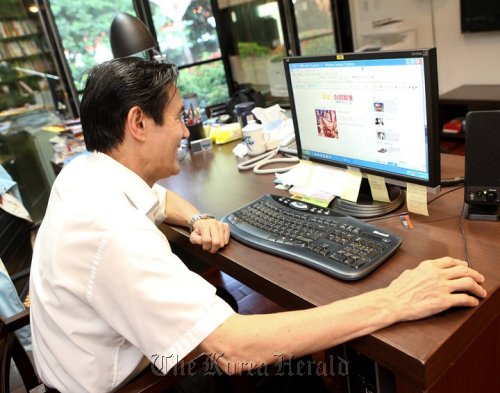Taiwan’s 2012 presidential campaign candidates have been actively interacting with supporters online, and they are taking advantage of social networking websites differently, research reveals.
Results from research recently done by the Internet Buzz Research Center (iBuzz) on President Ma Ying-jeou and Democratic Progressive Party presidential candidate Tsai Ing-wen’s Facebook pages indicated that the two differ in the content of their posts and how they interact with supporters.
Results from research recently done by the Internet Buzz Research Center (iBuzz) on President Ma Ying-jeou and Democratic Progressive Party presidential candidate Tsai Ing-wen’s Facebook pages indicated that the two differ in the content of their posts and how they interact with supporters.

Ma has 3.18 times more “fans” on Facebook than Tsai does, the research showed. While Tsai’s fanbase has increased from 70,000 to 211,985 since she announced her campaign for the next presidential election, Ma’s number of fans has also been constantly increasing and is currently at 673,466.
Lo Chih-chiang, Deputy CEO of Ma’s campaign headquarters, said that Ma’s three goals for using the social network have always been to pass on information, to collect public opinions, and to exchange ideas.
On Ma’s Facebook page, he is the only one with the authority to make posts, a power he has put to good use by posting video clips that fans eagerly respond to. So far, the research pointed out, Ma has made 209 posts, among which pure textual comments were rarely seen.
Tsai, on the other hand, has so far made 15,072 posts, most of which are textual. According to DPP officials, Tsai’s main use of Facebook is interaction with supporters. Fans are allowed to post on Tsai’s page, and she would respond.
Tsai, according to polls done by the media, often receives more support from the younger generation than Ma does, yet this is not the case on Facebook, the iBuzz team analyzed. This could be because of the style of their posts. Video clips spread faster and wider, the team pointed out, and Ma has been using this to his advantage.
In general, Tsai’s posts receive more “like’s” and are forwarded more often than Ma’s post, but the overall number of responses are fewer. Disregarding the attitude of the responses, Ma outnumbers Tsai by 12,725 to 60, the research concluded.
It is also noted by the iBuzz research team that Ma’s interaction with his supporters on Facebook increased significantly the day after this research was released; evidently Ma cares about evaluations on the Internet, the team said.
A new app unveiled on Ma’s Facebook page on July 6 called “Taiwan says good morning,” allows fans to “like” Taiwan, Ma’s campaign headquarters said. As part of Ma’s Early Bird Project, from 6am to 10:30 a.m. every morning, fans who leave a post on Ma’s wall to encourage Taiwan will receive a “punch” on their own walls, which indicates the time and order they have punched in.
The press conference held to introduce the app included quite a few apologies. When Ma tried the app Wednesday, it refused his access. The campaign team explained the error as system overload, saying that after over 2,000 accesses in half an hour, the app has temporarily stopped functioning, subsequently kicking out the president. “Sorry for the system breakdown,” the campaign team said, “and please continue to support the app.”
By Grace Soong, The China Post









![[Hello India] Hyundai Motor vows to boost 'clean mobility' in India](http://res.heraldm.com/phpwas/restmb_idxmake.php?idx=644&simg=/content/image/2024/04/25/20240425050672_0.jpg&u=)








